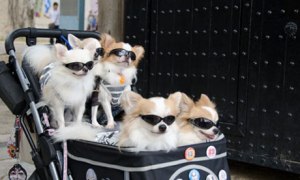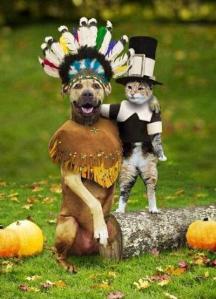* hi. last weekend there was a festival in my area that celebrated dogs. or rather, it celebrated the human obsession with dogs. there were dogs in buggies, dogs in booties, dogs with sunglasses, and people everywhere gushing over them. i get it – people love dogs and their own especially, like children. but there’s something strange about these (sometimes tiny) creatures that resemble wild beasts (or vermin, no offence meant) but are happily eating gourmet chow while being pushed around in a stroller and wearing a sequinned vest (true story).
we’ve domesticated dogs to be our pets and manageable and cute. otherwise they’d run away or kill you the minute a leash or collar came into their vicinity. what’s funny, though, is that modern humans share characteristics with domesticated dogs. our evolutionary requirements and theirs share certain conditions that have affected our brains and behaviour, which has manifested in the same way. you might be thinking, “what could i possibly have in common with that dachshund dressed up like a hot dog?” i’ll explain.
our brains and the processes within them are so easily affected by internal and external chemical and environmental triggers. we rarely even think about it until there’s something like a surge of criminal activity on a full moon. as much as we hate to think of the fragility of the body, it is decidedly worse to think about the malleableness of our minds.
as humans settled and built structures and systems, the adaptation to a framework made it easier to live and thus, the acceptance of the status quo and perpetuated implementation of it on the future humans that moved in was reasonably preferable. a kind of “self-domestication” reflects human motivation to cooperate and communicate and become civilized.
domesticated animals, like us, have lost brain volume – about 10 to 15 percent compared to the wild animal predecessors. via natural selection, less aggressive creatures were favoured to maintain a more peaceful interaction within the species and, in the case of animals, with humans. when the wild ones and domesticates are compared, they think differently. for example, wolves are more prone to flashes of insight, allowing them to solve problems on their own. dogs, with smaller brains, excel at using humans to help them. “man’s best friend” indeed.
so if we’re favouring docility to foster less aggression and killing each other etc., that’s a good thing, right? i’m not sure. i wonder what else we’ve lost in terms of challenging the status quo and not being complacent when we shouldn’t be. life for a dog is great as long as there are loving, doting humans around to do everything. but in the wild, the dog wouldn’t last up against the wolves. if our societal framework deteriorates and the technologies we’ve come to depend on falter, will we survive?
to lighten the mood, i’ll leave you with some ridiculous dog photos.
k *



